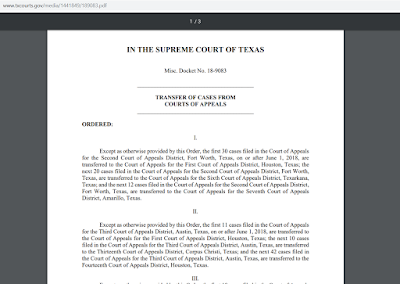Jurisdictional limitation
applies when Texas Supreme Court transfers appeal from one COA to another for docket-equalization purposes
In re M.E.H., Nos. 14-18-00675-CV and 14-18-00680-CV (Tex.App.
– Houston [14th Dist.] Oct. 9, 2018) (superseding mem. op., prior order withdrawn).
It makes perfect sense for the Texas Supreme Court to even
out the dockets among the 14 courts of appeals with transfers orders that send
batches of cases from overworked appellate courts to those with spare capacity
due to lower demand. To the extent there are inter-jurisdictional differences in
the caselaw of different appellate courts and their respective districts, the
conflict is addressed by the rule that the receiving COA is to apply the
binding precedents of the sending COA. But that does not address all
contingencies.
 |
| Example of SCOTX Order Transferring Appeals Cases |
In a recent family law dispute transferred from the Third
Court of Appeals in Austin, the Fourteenth Court of Appeals in Houston concluded
that doing so was not an option because the attempted appeals had not
originated from its own appellate district (which is coextensive with the First
Appellate District) and that it had no mandamus jurisdiction over the judge in
Travis County who had signed the challenged orders. That court is outside the appellate
district of the two Houston-based courts of appeals. Mandamus jurisdiction apparently
did not piggyback onto and travel with the Supreme Court’s docket equalization transfer
order that sent the underlying cases to Houston.
Order filed September 27,
2018, Withdrawn; Appeals Dismissed; and Memorandum Opinion filed October 9,
2018.
In The
Fourteenth Court of Appeals
NO. 14-18-00675-CV NO. 14-18-00680-CV
IN THE INTEREST OF M. E. H.
On Appeal from the 345th District Court
Travis County, Texas
Trial Court Cause No. D-1-AG-15-002375
MEMORANDUM OPINION
We withdraw our order dated September 27, 2018.
Appellant C.H. is involved in
litigation in Travis County regarding conservatorship of her son, M.E.H. She
appealed to the Third Court of Appeals from a final order signed February 2,
2018, called “Order in Suit to Modify Parent-Child Relationship.” The Supreme
Court of Texas transferred that appeal to this court on April 11, 2018. See Tex.
Gov’t Code Ann. § 73.001. That appeal is pending as number 14-18-00281-CV (“the
First Appeal”).
The trial court signed several
more orders during the pendency of the First Appeal. Appellant filed pro se
notices of appeal from four of those orders, and each appeal was transferred
from the Third Court of Appeals to this court as follows:
14-18-00675-CV
|
May 10, 2018 Order on Motion
for Enforcement and Further Orders (regarding C.H.’s Third Amended Motion for
Enforcement and Further Orders)
|
14-18-00680-CV
|
May 10, 2018 Order on Motion
to Revoke Suspension of Commitment (regarding S.K.’s Motion to Revoke
Suspension of Commitment)
|
14-18-00681-CV
|
May 10, 2018 Order on Motion
to Modify Judgment (regarding C.H.’s Motion to Modify Judgment)
|
14-18-00682-CV
|
July 9, 2018 Amended Order
(regarding June 12, 2018 Order on Respondent’s Plea of Abatement)
|
None of those four orders is a
final judgment or otherwise separately appealable.
For that reason, we notified
the parties on August 28, 2018, that we would dismiss those four appeals for
lack of jurisdiction unless any party demonstrated meritorious grounds for
retaining the appeals.
In response, appellant, through
a newly-retained lawyer, filed a motion in the First Appeal characterizing the
orders at issue in appeals 14-18-00675-CV and 14-18-00680-CV (“the Contempt
Appeals”) as orders refusing to hold the father (appellee S.K.) in contempt and
holding appellant in contempt, respectively. Contempt orders are not appealable
but are reviewable by mandamus. In re Long, 984 S.W.2d 623, 625 (Tex.
1999) (per curiam); Norman v. Norman, 692 S.W.2d 655, 655 (Tex. 1985)
(per curiam). The motion asks us to (1) treat appellant’s pro se notices of
appeal in the Contempt Appeals as attempts to invoke our mandamus jurisdiction, and (2)
consolidate the Contempt Appeals and the First Appeal.1
Section
22.221 of the Texas Government Code establishes our mandamus jurisdiction. A
court of appeals may issue a writ of mandamus against, as relevant here, “a
judge of a district, statutory county, statutory probate county, or county
court in the court of appeals district[.]” Tex. Gov’t Code Ann. § 22.221(b)(1).
We lack jurisdiction to issue a writ of mandamus against the trial judge in
this case because she is the judge of the 345th District Court of Travis
County, which lies outside our district. Id. § 22.201(d) (stating Travis
County lies within Third Court of Appeals District). If appellant were to seek
mandamus relief from this court, we would not have jurisdiction to grant that
relief.
In
conclusion, we lack jurisdiction over these appeals, and we would lack
jurisdiction to grant mandamus relief if we were to construe the notices of
appeal as attempts to invoke our mandamus jurisdiction. Accordingly, the
appeals are dismissed.
PER
CURIAM
Panel
consists of Justices Christopher, Jamison, and Brown.
1 The motion
also abandons appeals 14-18-00681-CV and 14-18-00681-CV (“the Abandoned
Appeals”). We construed that abandonment as a motion for voluntary dismissal
under Texas Rule of Appellate Procedure 42.1(a)(1) and dismissed the Abandoned
Appeals on September 18, 2018. In re M.E.H., Nos. 14-18-00681-CV,
14-18-00682-CV, 2018 WL 4427486 (Tex. App.—Houston [14th Dist.] Sept. 18, 2018,
no pet. h.) (mem. op.) (per curiam).
No comments:
Post a Comment